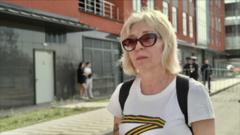With Victory Day approaching, Russians reflect on the significant sacrifices made during the Great Patriotic War while drawing parallels to the ongoing conflict in Ukraine. The Kremlin promotes the narrative of a continuous struggle against fascism, despite global criticisms of its actions in Ukraine.
Russia Commemorates 80 Years of WWII Victory Amid Ongoing Conflict in Ukraine

Russia Commemorates 80 Years of WWII Victory Amid Ongoing Conflict in Ukraine
As Russia marks the 80th anniversary of the victory in World War II, a complex narrative emerges linking past heroism with current military actions.
Article Text:
Eighty miles from Moscow, a park reverberates with the sounds of explosions and gunfire as historical reenactors recreate a pivotal World War II battle. Soviet soldiers storm across a bridge, ultimately replacing a swastika with the hammer and sickle, symbolizing the victory that defined the Soviet Union's legacy. Witnessed by a large crowd, this reenactment in Dubna showcases one of the final battles for Berlin in 1945, commemorating the date that Russia remembers as The Great Victory.
The 80th anniversary, which is stirring deep-seated emotions in a nation that intertwines its identity with stories of past valor and tragedy, leads to powerful conversations about family legacy. One spectator, Katya, recalls her grandfather, missing and later confirmed dead near Berlin. Today, her son is on the front lines in Ukraine, a narrative that underscores the cyclical nature of conflict: her family history entwined with current national warfare.
During the tumultuous years of WWII, the Soviets faced Hitler's invasion, a conflict that cost over 27 million Soviet lives. This monumental loss is the cornerstone of a national consciousness built on victory and sacrifice, but the ongoing war in Ukraine complicates this narrative. The Russian government presents its present invasion as a necessary operation to protect itself against a resurgence of fascism, drawing a direct parallel to the historic fight against the Nazis.
Media sources in Russia perpetuate this viewpoint through programming that emphasizes past grievances and current threats, painting the state as a victim. The interpretation of the Great Patriotic War extends into modern messaging, with new monuments and public memorials uniting the narratives of past and present soldiers.
As Victory Day approaches, Moscow prepares for large-scale commemorative events, with military parades expected to showcase both historical and ongoing strength. This celebration is marred by dissonance, as many families, like Katya's, confront the devastating human toll of war.
Fyodor Melnikov, a decorated veteran, reflects on the haunting memories of his brother lost in WWII, expressing a universal wish for peace and understanding. On May 9th, as Russians remember the heroism of their ancestors, they also grapple with the realities of contemporary warfare and its consequences.
The Kremlin has announced the attendance of numerous world leaders at the commemoration, even as tensions with Ukraine escalate, suggesting a complicated and multifaceted legacy that continues to shape Russia's story. Amid military displays and public sentiment, the specter of past sacrifices lingers as a reminder of both the cost of war and the enduring hope for peace.
Eighty miles from Moscow, a park reverberates with the sounds of explosions and gunfire as historical reenactors recreate a pivotal World War II battle. Soviet soldiers storm across a bridge, ultimately replacing a swastika with the hammer and sickle, symbolizing the victory that defined the Soviet Union's legacy. Witnessed by a large crowd, this reenactment in Dubna showcases one of the final battles for Berlin in 1945, commemorating the date that Russia remembers as The Great Victory.
The 80th anniversary, which is stirring deep-seated emotions in a nation that intertwines its identity with stories of past valor and tragedy, leads to powerful conversations about family legacy. One spectator, Katya, recalls her grandfather, missing and later confirmed dead near Berlin. Today, her son is on the front lines in Ukraine, a narrative that underscores the cyclical nature of conflict: her family history entwined with current national warfare.
During the tumultuous years of WWII, the Soviets faced Hitler's invasion, a conflict that cost over 27 million Soviet lives. This monumental loss is the cornerstone of a national consciousness built on victory and sacrifice, but the ongoing war in Ukraine complicates this narrative. The Russian government presents its present invasion as a necessary operation to protect itself against a resurgence of fascism, drawing a direct parallel to the historic fight against the Nazis.
Media sources in Russia perpetuate this viewpoint through programming that emphasizes past grievances and current threats, painting the state as a victim. The interpretation of the Great Patriotic War extends into modern messaging, with new monuments and public memorials uniting the narratives of past and present soldiers.
As Victory Day approaches, Moscow prepares for large-scale commemorative events, with military parades expected to showcase both historical and ongoing strength. This celebration is marred by dissonance, as many families, like Katya's, confront the devastating human toll of war.
Fyodor Melnikov, a decorated veteran, reflects on the haunting memories of his brother lost in WWII, expressing a universal wish for peace and understanding. On May 9th, as Russians remember the heroism of their ancestors, they also grapple with the realities of contemporary warfare and its consequences.
The Kremlin has announced the attendance of numerous world leaders at the commemoration, even as tensions with Ukraine escalate, suggesting a complicated and multifaceted legacy that continues to shape Russia's story. Amid military displays and public sentiment, the specter of past sacrifices lingers as a reminder of both the cost of war and the enduring hope for peace.




















